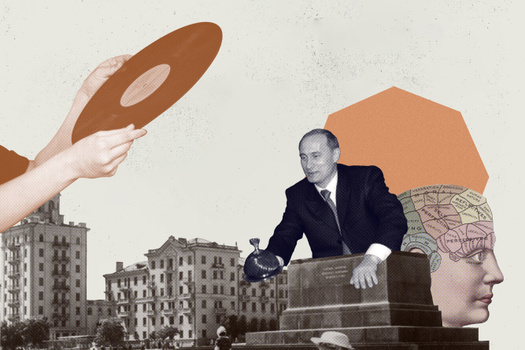
‘A chance for revenge’ The rise and fall of ‘methodology,’ the school of thought that produced the idea of the ‘Russian world’
Мы говорим как есть не только про политику. Скачайте приложение.
The philosopher Georgy Shchedrovitsky and his pupils were the USSR’s first political consultants. Beginning in the 1960s, the so-called “methodologists” advised Communist Party apparatchiks, believing that they could change the society by “reprogramming” the minds of its people. In the 1990s, Shchedrovitsky’s disciples proposed the idea of the “Russian world.” Twenty years later, this concept entered Vladimir Putin’s geopolitical imagination, becoming a pretext for the invasion of Ukraine. Following the invasion, another “methodologist,” Sergey Kiriyenko, has become Putin’s point man in the Donbas. Meduza special correspondent Andrey Pertsev tells the story of the rise and fall of “methodology.”
In April 2021, the well-known Russian political consultant Timofey Sergeytsev wrote an opinion piece for the state news service RIA Novosti, titled “The Ukraine We Don’t Need.” The article attempted to justify the need for the “denazification” of Ukraine. Nazism, Sergeytsev argued, was “flourishing” in Ukraine and priming it for aggression:
“The liquidation of such a Nazi society will require not only the excision of its top leadership but also a purge of the Nazified population from the Nazi influence and from involvement in Nazi ideology and practices. This is precisely the case presented by Ukraine, which has taken a Nazi oath of allegiance en masse, via the apparently innocuous political vector aimed at joining Europe, in whose context, nevertheless, being ‘European’ is unambiguously linked with racial superiority, not only by the ideologues but also by a significant portion of the population.”
A year later, Vladimir Putin’s armed forces entered Ukraine on a mission of “denazification.” Sergeytsev followed up on the invasion with a new article for RIA Novosti, arguing that the role of fostering “Ukrainian Nazism” belonged to “the collective West,” and that Ukraine’s “denazification” required the country’s “de-Ukrainization” and “de-Europeanization.” “Ukro-Nazism contains a greater, not lesser danger to the world and to Russia than Hitler’s German Nazism,” he wrote. In June 2022, Sergeytsev was sanctioned by the EU as a “central figure” in Russia’s propaganda.
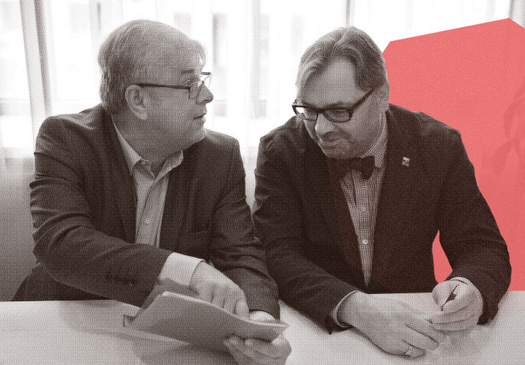
A physicist by training, Sergeytsev initially specialized in the study of neutrinos. But, in the 1980s, while attending the Moscow Institute of Physics and Technology, he was captivated by the philosophical lectures of Georgy Petrovich Shchedrovitsky, the founder of the school of thought dubbed “methodology,” whose students sometimes referred to him simply as “GP.” Shchedrovitsky’s ideas and charisma drew many young minds into his orbit. They altered Sergeytsev’s career, too.
Towards ‘social programming’
Following Stalin’s death in 1953, an ideological “thaw” began in USSR, leading to a relaxation of restrictions on religion and other forms of free-thinking — including disciplines previously considered “pseudo-scientific.” As the former “pseudosciences” of genetics and cybernetics, as well as sociology and ecology, gained legitimacy in the Soviet state, a new era of open-mindedness was inaugurated. As sociologist of religion Nikolai Mitrokhin writes, the intelligentsia welcomed the new “disciplines” of “futurology, ufology, astrology, ‘methodology,’ and the ‘science of the noosphere’.”
Earlier, in 1952, the philosophers Georgy Shchedrovitsky and Merab Mamardashvili, together with sociologist Boris Grushin and writer Alexander Zinoviev, founded the Moscow Logical Circle to investigate cognition. Soon, however, each of its founders would go on his own way. Shchedrovitsky would carry on his research within the framework of “methodology.” His new research group viewed cognition and language as a kind of “program” “operant” within a person’s consciousness. The person was, in turn, understood as a kind of programmable computer.
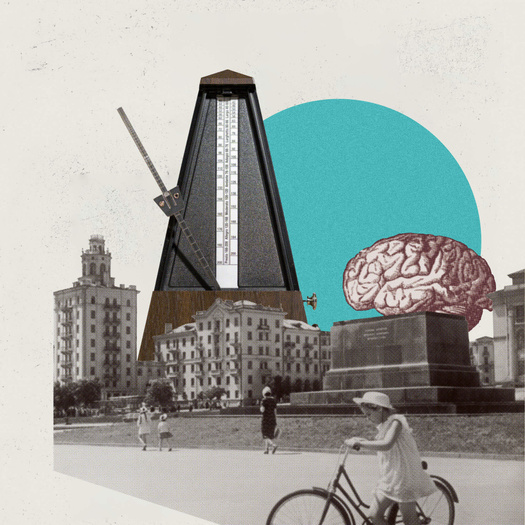
One of the drivers of Shchedrovitsky’s seminars was the practice of “reflection.” Participants would analyze each “thought-procedure” and each step that led the speaker from premises to conclusions. These seminars attracted scholars and curious members of the intelligentsia, who would participate at first as respondents, some of them later becoming involved as speakers or moderators. People who had participated in all those roles could go on to organizing their own seminars, independent of the original group.
The literary scholar and culture critic Ilya Kukulin, who studied the “methodologists” at the turn of the millennium, noted that seminar participants believed that their particular mode of thinking had the capacity to transform society. “Methodologists” believed that they could change the world, and to do so on “any scale whatsoever.”
Shchedrovitsky considered himself a Marxist and was a member of the Communist party. In 1968, he was expelled from its ranks for signing a letter in support of dissidents Yury Galanskov and Alexander Ginzburg. Still, according to political analyst Gleb Pavlovsky, who shared a social circle with Shchedrovitsky in the 1960s, Shchedrovitsky himself was not then considered a dissident, nor did he attempt to appear as such. He was instead someone who “worked in an institute, and published work in state-run journals.” He even offered his expertise to party functionaries. “He’d tell [Soviet officials]: Here, why don’t we help you tighten the screws here and there. We can help build new governance structures, and clean up what’s already in place,” Pavlovsky recalled when speaking to Meduza.
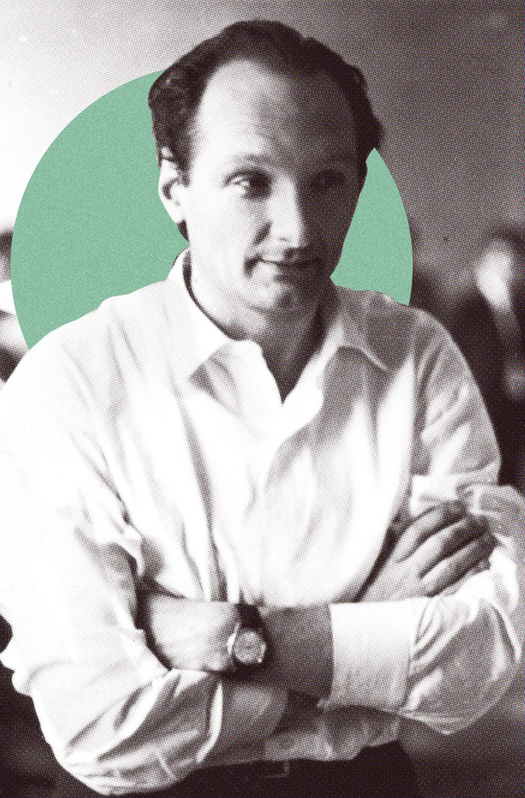
Beginning in the 1960s, the “methodologists” paid a lot of attention to pedagogy, or methods of education. Shchedrovitsky himself was at that time a lead researcher at the Research Institute for Preschool Education and its laboratory for psychology and psychophysiology. Shchedrovitsky saw early education as a kind of “engineering.” Quoting Shchedrovitsky, Ilya Kukulin explained the direction of his research as follows: “Within the system of pedagogy, the pedagog-engineer emerges as a specific specialty tasked with developing a model, or blueprint, of a member of the future society.”
In the words of the nationalist politician Konstantin Krylov, “Shchedrovitsky saw individual consciousness not as a locus of freedom but as an arena of design, construction, or, in simplified terms, manipulation.”
‘Generalist expertise’
In the late 1970s, Shchedrovitsky began to conduct “organizational” or “modeling” games based on his previous seminar experience. Modeling games were expected to solve practically any kind of a social problem — and he proposed them as a method of reorganization useful in the industry and in governance.
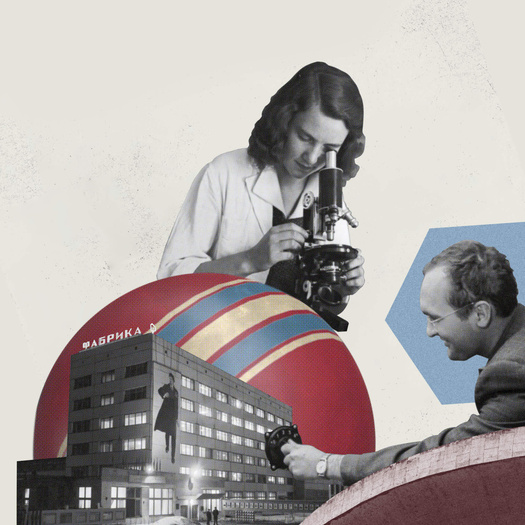
“The 1980s were a time of transition to market economy. It marked the beginning of economic relations between the departments of a single concern,” explains the political consultant Marat Gelman in conversation with Meduza. “Earlier, the concern might have existed without being aware of itself as an organism, without thinking about the relations formed and continuing to form inside of it. The ‘methodologists’ often came in to set up communication inside the organization.” Sometimes, according to Gelman, employees discovered more about their organization in three days of modeling games than they did in years of working there.
“It looked like some kind of miracle,” Gelman said. “It would become clear why certain people are ineffective, how to make them effective, and why certain processes didn’t work before.”
By conducting these “methodological” games, Shchedrovitsky and his disciples gradually got to know the various key people in the Soviet state: party apparatchiks, government functionaries, directors of organizations. The influence of the “methodologists” grew accordingly. Shchedrovitsky’s colleague, the art historian Alexander Rappaport, reminisced about his tactics: “GP encouraged the circle’s members to join the Communist party, thinking that the Soviet society offers no other paths towards influence.” “As I see it now,” he continued, “GP was anticipating some kind of reform, seeing clearly that the USSR is facing a dead end. But he did not expect that the crisis would be escaped by turning to free markets. He probably expected some special type of socialist technocracy to win.”
According to Rappaport, Shchedrovitsky’s critics thought that what he envisioned was, in fact, a “technocracy of the elected,” accompanied by the enslavement of the masses. Shchedrovitsky’s own remarks encouraged such interpretations. In 1989, he stated at a public talk:
“I’ll be honest with you, even though others might throw stones at me for this: I don’t see a difference between totalitarianism and non-totalitarianism. Is that clear? I don’t see it. And I think that totalitarian organization is the only form of organization for any human society. Germany and USSR may have surpassed the others in this, just by a nostril. But this is what awaits everyone, proud Britain included. There is no alternative, respected colleagues — this, goddamn it, is a necessity of human social development!”
A Russian politician who began his career in the 1980s told Meduza that the “methodologists” were appalled by perestroika — because they had hoped to get to reorganize the USSR themselves, and to preserve it.
But Russia took the path of market reforms. Georgy Shchedrovitsky died at the dawn of that transformation, in 1994. His disciples faced a completely new Russian reality — and adapted to it, by turning into political strategists.
The ideal client
In mid-1990s, the “methodologists” were joined by the already well-established political strategist, Yefim Ostrovsky, credited with the victory of Sergei Mavrodi (founder of the MMM Ponzi scheme) in the 1994 State Duma elections. Ostrovsky’s successes drew new figures into the orbit of political consulting. The former art dealer Marat Gelman recalled, laughing, that Ostrovsky “embroiled” him in political strategy by asking him for advice on a specific situation — and paying him “a fairly significant sum in hard currency” right on the spot, simply for speaking his mind. “Back then, I was flummoxed,” Gelman said. “No one had ever paid me for thinking about someone else’s problem.”
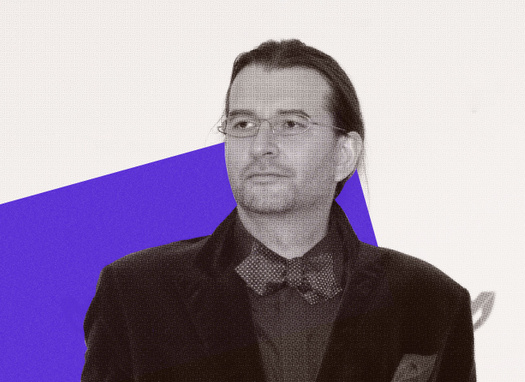
Gleb Pavlovsky, who had founded, together with Gelman, the Foundation for Effective Politics (FEP) in 1995, was similarly drawn into the sphere of political consulting, and is now considered one of the architects of Putinism. Pavlovsky told Meduza that Ostrovsky advised the former USSR president Mikhail Gorbachev, and later met Putin during Anatoly Sobchak’s St. Petersburg mayoral campaign. Still, that first meeting did not lead to collaboration right away. Ostrovsky’s rise to power would parallel the rise of another actor — Sergey Kiriyenko.
Having met Kiriyenko as far back as the 1980s, Ostrovsky converged with him once again in 1999, at the moment when Kiriyenko’s political movement, Novaya Sila (“New Force,” founded in 1998), was planning to participate in a State Duma election. In this campaign, Kiriyenko would be assisted by Yefim Ostrovsky (already an avowed “methodologist” by that time) and by Georgy Shchedrovitsky’s son, Pyotr.
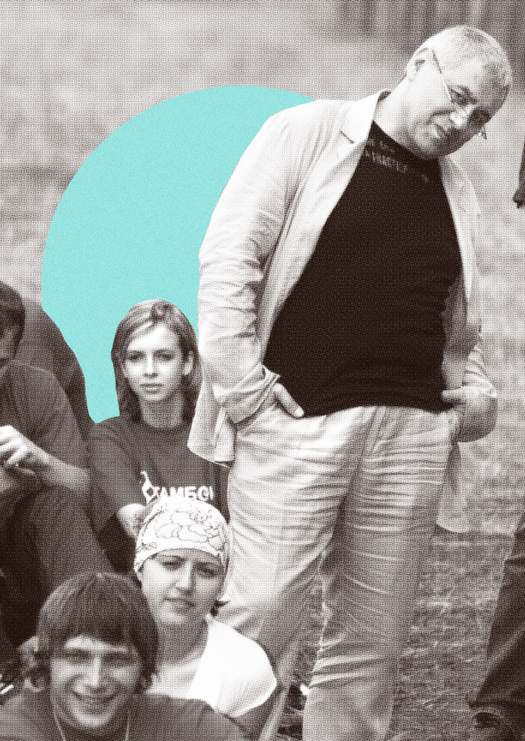
The New Force’s communications immediately acquired a “methodological” tone. The organization was not only proposing economic and constitutional reforms, but also the development of a “new political language.” In June 1999, Kiriyenko announced that he was presenting Yeltsin with a transition plan. That plan included a cadre contest in the signature style of the “methodologists.”
As events progressed, Kiriyenko made it into the State Duma together with the Union of Right Forces (which included parties founded by Boris Nemtsov and Irina Khakamada). Also in 1999, he entered his candidacy into the Moscow mayoral election, competing against the incumbent, Yury Luzhkov. The Foundation for Effective Politics managed both Kiriyenko’s and the Union’s campaigns, as well as that of another organization, Unity, which would later morph into United Russia. Within the FEP, Marat Gelman oversaw strategy for Kiriyenko and the Union of Rightist Forces, while Gleb Pavlovsky managed the Unity party’s campaign.
“Of course, we made no objective of Kiriyenko actually winning,” Pavlovsky told Meduza in 2018. “Our goal was to maximally weaken Luzhkov as a presidential contender.” (Kiriyenko won 11.3 percent of the vote.)
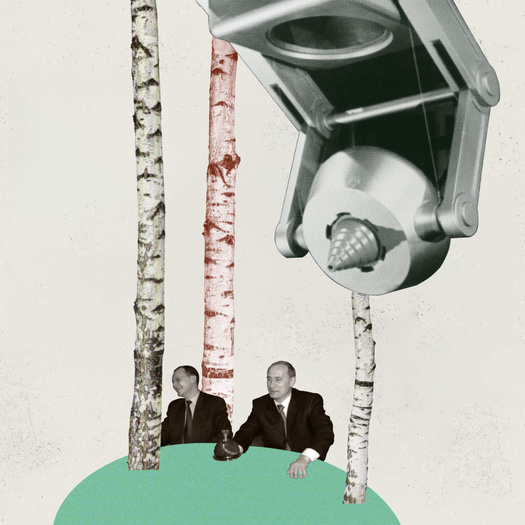
In 2000, Vladimir Putin became president. It was Kiriyenko, in his prior stint as prime minister, who had appointed Putin the head of FSB. When Putin settled in the Kremlin, Kiriyenko, who disliked the publicity of his State Duma post, was given a much desired sinecure as presidential envoy in the Volga Federal District. (Putin had just introduced this role, supposedly as the means of strengthening the “power vertical.”) The “methodologists” Pyotr Shchedrovitsky and Yefim Ostrovsky followed their patron to Nizhny Novgorod.
When, in 2005, Kiriyenko moved to a new post — as the head of Rosatom, the Russian agency for atomic energy — “methodologists” came along with him once again. “Kiriyenko created a unified structure that had to be organized and packaged — and ‘methodologists’ knew how to do that,” one of his acquaintances explained to Meduza.
The ‘Russian world’
Yefim Ostrovsky had pondered ideological questions long before they became urgent in the new system of Russia’s governance. In 1996, Ostrovsky wrote about the causes of the USSR’s collapse, invoking the possibility of “avenging” the demise of the “great empire”:
“The country that first recognizes the importance of virtual weapons will be the first that tips the balance in that sphere. It will be restored later — but this is the field in which Russia can win the decisive battle of the Cold War. It is the virtual space that can conduct the retaliating Kind Strike against the West. It is here that the Great Power has a chance for revenge. Revenge in the Cold War.”
This was not far away from the views of Georgy Shchedrovitsky, who had thought that the developed countries both East and West were interested in “containing” Russia. Continuing that line of thought, Yefim Ostrovsky was interested in “programming” Russia with an ideology reliant on references to the Cold War and to Russian self-sufficiency. In mid-1990s, he created the “Be Russian, Buy Russian” campaign, designed to advance a “new pattern of consumption for our compatriots.” Ostrovsky described the project as a “state-wide politico-advertising and educational campaign with elements of macro-psychiatric influence.” This was, once again, an echo of Georgy Shchedrovitsky’s ideas of “social programming.”
By late 1990s, Yefim Ostrovsky and Pyotr Shchedrovitsky proposed a new fundamental concept: the “Russian world” (Russky mir, in Russian) After 2010, this phrase would sound more and more often, spoken by high-ranking functionaries and by Putin himself. Ultimately, the imperative of “defending the Russian world” would become the main official justification of Russia’s military intervention in the Donbas. However, it appears as though the Kremlin’s interpretation turned the original idea on its head.
Marat Gelman explained the original meaning of the phrase “Russian world” in conversation with Meduza:
“The idea was this: Russia needs to enter the world arena with goods, with products that can attract interest. The country has problems with competition, but it also has its agents, the ‘Russian world,’ that is, our people in other countries, people who speak Russian, have been raised on Russian culture. It is through them that it’s possible to enter the global market with new goods.”
According to Gelman, Ostrovsky and Shchedrovitsky were both very conscious that the “Russian world” was not identical with the Russian state. Their thinking was not in terms of war, but in terms of market competition.
In 1999, Pyotr Shchedrovitsky wrote the article “The Russian World and the Transnationally Russian.” In it, he used the word “war” as a metaphor for competition: “In recent decades, the very type of warfare is changing — the algebra of war is economic competition.” “Brands and trademarks are the main weapons of the new-generation industrial warfare.” Russia’s strategy in this “war” was to make the “Russian world,” as “a community of people who speak the Russian language” an intermediary for advancing Russian brands and trademarks into new markets of the future world.
But another “methodologist,” Kiriyenko’s former advisor Sergey Gradirovsky, understood the concept of the “Russian world” differently: namely, as Russia’s “integration with the countries of the former USSR,” which still have Russian-speaking populations. Justifying his vision by analogy in 2009, Gradirovsky stated that “the proposed Russian geo-cultural world is akin to the post-imperial formations of Europe, to the British Commonwealth, the Ibero-American states, the community of Francophone countries, and other analogous formations.”
Although Gradirovsky insisted that this was by no means a defense of “returning” the former Soviet territories into the Russian fold, the idea of the “Russian world” was appropriated precisely for that agenda. Indeed, the full-scale invasion of Ukraine in February 2022 began with Putin repeating claims about the need to defend the Russian-speaking population of the Donbas.

Gleb Pavlovsky thinks that, since 2014, the concept of the “Russian world” no longer bears any relation to the ideas of Ostrovsky and Pyotr Shchedrovitsky. Marat Gelman is also of the opinion that the concept was appropriated and discredited by the government, which “befouls everything, from victory in the Second World War to Pushkin.” “It knows how to appropriate,” Gelman added, “but it does it poorly.”
Asked whether he feels frustrated by this distortion, Pyotr Shchedrovitsky sent Meduza the following response in writing: “A philosopher has to be ready for all his meanings and content to be distorted with mass use.” That said, he believes there was only one true methodologist: his father. “There are many impostors. It’s true. But some time down the road, someone has to figure out, who really did perpetuate the ideas of Shchedrovitsky Sr. At the very least, they need to consider and compare the works of these authors,” Pyotr Shchedrovitsky said. He declined to elaborate whom he considered to be an “impostor.”
Pyotr Shchedrovitsky did not respond to all of Meduza’s questions. Yefim Ostrovsky and Sergey Gradirovsky agreed to respond to questions, but did not get back to Meduza prior to publication. Timofey Sergeytsev could not be reached for comment. Sergey Kiriyenko did not respond to the questions Meduza sent him via the Kremlin’s press service.
Story by Andrey Pertsev
Abridged translation by Anna Razumnaya
Photo credits: Artnana / Shutterstock, Romsavka / Shutterstock, Boris Kavashkin / TASS, Gennady Gulyaev / Kommersant, Sonja Filitz / Shutterstock, Wikiart, Alexander Ovchinnikov / TASS, Fotokhronika / TASS, Kugo / Shutterstock, AwesProduction / Shutterstock, Wikimedia Commons, Alexey Filippov / TASS, Alexander Saverkin / TASS, Everett Collection / Shutterstock, Jocic / Shutterstock, Master1305 / Shutterstock, Bayhu19 / Shutterstock, Kilic Inan / Shutterstock, Yuri Smityuk / TASS